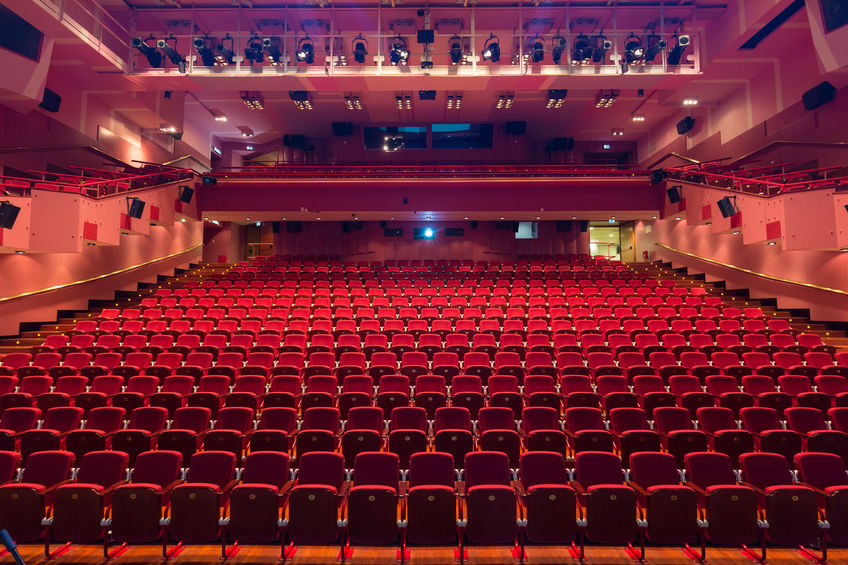 If you find yourself in the vicinity of Hollywood Boulevard in Los Angeles, you might come across the recently restored Egyptian Theatre. This historic landmark has played a crucially important role in the history of American cinema for more than a century now. Streaming giant Netflix, which purchased the theatre earlier this decade, funded a restoration to bring the theatre back to its original appearance. To understand the magnitude of the project, it’s important to take a look back at the history of the theatre and the challenges it has faced:
If you find yourself in the vicinity of Hollywood Boulevard in Los Angeles, you might come across the recently restored Egyptian Theatre. This historic landmark has played a crucially important role in the history of American cinema for more than a century now. Streaming giant Netflix, which purchased the theatre earlier this decade, funded a restoration to bring the theatre back to its original appearance. To understand the magnitude of the project, it’s important to take a look back at the history of the theatre and the challenges it has faced:
A Show Business Pioneer
The Egyptian Theatre was the brainchild of showman Sid Grauman and real estate developer Charles E. Toberman. The two were also responsible for notable cinema projects such as the El Capitan, the Million Dollar Theatre, and the Chinese Theatre. The project took 18 months to complete and cost more than $800,000 at the time.
The theatre opened in 1922, and almost immediately started making history. In October of that year, it served as the location of the world’s first film premiere, Robin Hood, complete with the first-ever red carpet. In the years that followed, it held premieres for The Ten Commandments (1923), The Thief of Bagdad (1924), Ben-Hur (1959), My Fair Lady (1964), and Star Wars: Return of the Jedi (1983).
The Egyptian suffered a brief decline starting in the late 1920s when Grauman opened The Chinese Theatre just down the street. He handed ownership to Fox West Coast Theaters, which operated it as a re-run house for more than a decade. In 1944, it became the MGM exclusive Hollywood showcase until the practice of major studios owning theaters was outlawed. United Artists took over in 1949 and partnered with 20th Century Fox in the 1970s.
A Death and Rebirth
The Egyptian Theatre suffered a long, gradual decline until finally closing in 1992. The Los Angeles Redevelopment Agency purchased it that same year with a goal of restoring it. The Northridge Earthquake put a damper on those plans when it badly damaged the structure in 1994. Two years later, the CRA sold the property to American Cinematheque, who agreed to do the renovations.
The theatre opened again in 1998 as a changed building. The former 1,100-seat theatre was replaced with a 616-seat auditorium and a 78-seat screening room, the latter of which was named for Steven Spielberg. However, the theatre closed its doors at the onset of the COVID-19 pandemic in 2020 amid rumors of a sale to Netflix.
Further Renovations and The Netflix Era
Netflix announced the purchase of The Egyptian Theatre in May 2020 and soon got to work on a $70 million renovation project. They hired Whiting/Turner as the general contractor and Ross Brennan as the principal architect. The aim was simple: to return the Egyptian to its original splendor. This was partly accomplished by restoring historic aspects such as the retro neon sign out front; the jeweled auditorium ceiling, adorned with lotus flowers, ibis, and an Egyptian scarab; and the murals and elaborate fountain in the front courtyard.
The restoration process included removing nearly everything American Cinematheque installed in the previous renovation, including the balcony and the Spielberg Theatre, reducing seating to 516. The exterior stucco and hollow tile wall sections were also extracted so that a waterproof membrane could be installed. Meanwhile, the lobby was redesigned, the seating area was widened out to the original configuration, and a large proscenium was constructed.
The theatre was reopened on Nov. 9, 2023, for the premiere of “The Killer” followed by a question and answer session with director David Fincher. The theatre has since held premieres for other major Netflix releases, including “The Electric State” in 2025. Additionally, previous owners American Cinematheque program classic film screenings on the weekends. Netflix also operates a store on the premises, where guests can purchase merchandise from all of the platform’s major properties.
More than a century on from its opening, The Egyptian Theatre still draws large crowds for major cinematic events. In fact, it’s one of five remaining theatres in the United States capable of projecting nitrate film, in addition to 35mm, 70mm, and digital formats.
At Construction Protection Systems, we’re proud to have played a small part in restoration of The Egyptian Theatre. Stay tuned for more updates from the makers of 1-2-3 Door Shield—the original, reusable door protection system.
